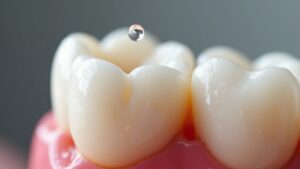Ever asked why your teeth feel sensitive after that sour candy? Malic acid, found in fruits and many processed foods, isn’t just tangy—it’s quietly reshaping your dental health. While you could love how it brightens flavors, this acid strips away enamel, tips mouth pH into danger zones, and even lets harmful bacteria thrive. But there’s more it’s doing—things your dentist won’t tell you until it’s too late. Ready to find out the concealed costs of that zesty treat?
Enamel Erosion and Increased Vulnerability to Decay
At the time one enjoys an apple or sips on fruit juice, the malic acid in them can quietly start affecting your teeth. This natural acid, found in many acidic foods, lowers your mouth’s pH, softening enamel and making it prone to erosion.
Once enamel wears down, your teeth lose their protective shield, leaving them vulnerable to tooth decay. Even healthy choices like apples or citrus juices can contribute provided that you aren’t careful. The more often you consume these foods, the longer your teeth bathe in acid, speeding up damage.
You may notice increased sensitivity to hot or cold—a red flag for thinning enamel. To protect your smile, rinse with water after eating acidic foods and wait to brush to avoid scrubbing weakened enamel. Regular dental check-ups help catch initial signs of trouble.
Altered Mouth Ph Balance and Prolonged Acid Attacks
At the moment one bites into a tangy apple or sips fruit juice, malic acid doesn’t just add flavor—it throws the mouth’s pH balance off track.
The acid drops the mouth’s pH below 5.5, starting acid attacks that weaken enamel for up to 20 minutes. Should one snack on acidic foods often or doesn’t rinse afterward, saliva can’t neutralize fast enough, leaving teeth vulnerable.
Repeated acid attacks wear down enamel, exposing sensitive layers underneath. Even healthy habits like eating apples can backfire when an individual doesn’t balance them.
Sipping water, chewing sugar-free gum, or waiting 30 minutes before brushing helps protect dental health. Small changes prevent big problems, so enjoy your favorite treats smartly.
Heightened Tooth Sensitivity Due to Excessive Exposure
Repeated acid attacks from malic acid don’t just weaken enamel—they can leave your teeth feeling like they’ve lost their armor.
At the moment dental erosion wears down your protective layer, the sensitive dentin underneath gets exposed, making hot coffee or ice cream suddenly painful.
Malic acid, found in sour treats and some drinks, speeds up this process by softening enamel over time. The more often you consume it, the worse the sensitivity becomes.
You could notice sharp zings when biting into something cold or sweet, a clear sign your teeth are struggling.
To protect yourself, rinse your mouth with water after acidic foods, use a straw for drinks, and wait 30 minutes before brushing to avoid scrubbing weakened enamel.
Your dentist can also recommend treatments to strengthen your teeth and reduce discomfort.
Impact on Oral Microbiome and Harmful Bacteria Promotion
At the time malic acid throws off your mouth’s natural balance, it doesn’t just hurt your teeth—it invites trouble. The acid content lowers your oral pH, creating a playground for harmful bacteria like Streptococcus mutans to thrive.
These bacteria love acidic environments and multiply faster, producing even more acid as they feed on sugars in your mouth. Over time, this weakens your enamel and gives harmful bacteria a stronger foothold. You may notice more plaque buildup or a sour taste lingering longer than usual. It’s like rolling out the red carpet for cavities.
While malic acid occurs naturally in fruits, overdoing it—especially from processed sources—can tip the scales against your oral microbiome. Balance is key to keeping those bad bugs in check.
Disruption of Enamel Remineralization and Dental Health Compromise
As malic acid lingers in your mouth, it doesn’t just make your taste buds tingle—it messes with your enamel’s natural repair process. At the point the acid sticks around, it keeps your mouth too acidic for remineralization to happen, leaving your enamel weak and vulnerable.
Here’s how it worsens your dental health:
- Demineralization wins: The acid strips minerals from your enamel faster than saliva can replace them.
- Saliva can’t keep up: Normally, saliva neutralizes acid, but malic acid overwhelms it, slowing enamel repair.
- Sensitivity spikes: Weak enamel means more pain from hot, cold, or sweet foods.
- Cavities creep in: Without remineralization, tiny holes in your enamel grow into full-blown cavities.
Frequent exposure to malic acid, especially from sour treats or juices, speeds up this damage.
Brush gently after eating acidic foods, but wait 30 minutes to avoid brushing weakened enamel.
Swap acidic snacks for crunchy veggies to help saliva do its job.


